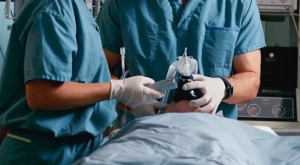 At eighty four my mother is no longer living a high quality life. Over the last fifteen years a series of events, starting with a back surgery that did more harm than good, has led to a long slow slide towards a life split between bed and wheelchair.
At eighty four my mother is no longer living a high quality life. Over the last fifteen years a series of events, starting with a back surgery that did more harm than good, has led to a long slow slide towards a life split between bed and wheelchair.
She is comfortable, living at home in a lovely apartment with the help of an aide.
She has her wits about her, sort of. Her body, and in turn her mind, has deteriorated slowly but surely so that someone who was once sharp as a tack, now has five questions at her disposal that are on an endless replay loop.
While I can point to several moments that led to her current state, today’s post is about general anesthesia and geriatric patients. The first back surgery did not serve my mother well as I believe that the surgeon must have nicked a nerve because all of her abductor muscles atrophied within a year or two of that initial surgery.
That began my mother’s journey towards a sedentary life. For a while after the surgery, she developed a trendelenburg gait and was able to get around without assistance. Soon enough, though, walking sticks (a type of crutch) were required. Those lasted a good amount of time.
The transition to a walker and electric scooter took a while longer, but as of now, my mother splits her time between a bed, wheelchair, and electric scooter.
My father died four years ago and that took a major toll on my mother’s spirit.
After fifty-six wonderfully dysfunctional years she lost her best friend and in many ways her prime reason for living.
All of this backstory leads to her current state of being which was influenced in large part by a hip replacement surgery, and general anesthesia, she underwent three years ago.
Walking into the hospital after the hip replacement was an experience I won’t soon forget.
Her room was empty and I was guided to the cafeteria where I found my mother with her head lolling to the side and her mouth hanging open in an oval that she didn’t seem capable of closing.
It didn’t take long for me to get home and learn about postoperative cognitive dysfunction (POCD), a condition commonly found after surgery, especially in geriatric patients.
The rest unfortunately is history. My brother, sister, and I have watched my once vibrant mother slide into a confused and almost vacant state.
It is both heartbreaking and a wake-up call/ warning sign about what the future holds for myself, my siblings and my wife and children.
It isn’t that we shouldn’t trust doctors but we shouldn’t trust doctors blindly. Had I done my due diligence I don’t think my mother would have undergone the hip surgery in her eighties that required general anesthesia. In the end the surgery helped her pain but not her brain.
Here are a few links to articles and studies on the subject of general anesthesia and the elderly:
Anesthesia and cognitive disturbance in the elderly
General Anesthesia Can Make The Elderly 15% More Likely To Develop Alzheimer’s Disease
***
